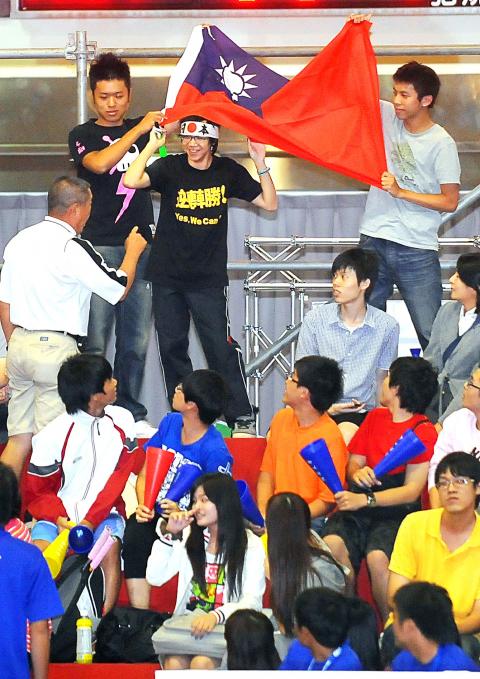|
Flag sparks controversy at Taoyuan
basketball match
BY LUNG PO-AN AND CHEN HUI-PING / STAFF
REPORTERS

Officials confront spectators holding up the
national flag at the Asian University Men’s Basketball Championship in Taoyuan
County on Thursday.
PHOTO: WANG MIN-WEI, TAIPEI TIMES
An initiative undertaken by Kainan University students yesterday to decorate
their campus with Republic of China (ROC) national flags led to a dramatic
reaction from a Chinese basketball team, which decided to withdraw from a game
it was scheduled to play against a side from Mongolia yesterday afternoon.
Kainan University was the host of this year’s Asian University Basketball
Championship, being held in Taoyuan County. Hundreds of ROC national flags were
visible from the campus’ parking lots all the way to the bleachers. Upon seeing
the flags, a bus carrying the Chinese team left abruptly and the team withdrew.
“We decided to bring in more national flags as a protest against the tournament
organizers because we are not satisfied with the way they handled the incident
yesterday [Thursday],” said a Kainan University student who declined to be
named. “I don’t understand why they stopped us from hanging up our national
flags.”
The student was referring to the incident on Thursday in which spectators were
asked to fold up the ROC national flag they were waving at a university
basketball game in Taoyuan County in the latest controversy over the display of
the flag at international sporting events.
The incident took place when officials of the Chinese Taipei University Sports
Federation (CTUSF), the organizer, asked three Kainan University students to
take down their meter-high ROC flag at a game between Taiwan University
All-Stars and China’s Tianjin Polytechnic University, saying that it was because
of a “tacit understanding” with China.
The move immediately sparked outrage from both the students and opposition party
lawmakers, who slammed the gesture as “unreasonable” and “disappointing.”
“I’m only half Taiwanese, but whenever I go to international competitions, I
always bring the Taiwanese flag,” said Chong Nian-chu (塚念祖), a first-year
accounting student at the university. “This competition took place in Taiwan and
in our school’s own gymnasium. Why was [I] not allowed to do so?”
Adding that he was also half Japanese, Chong said his intention was originally
to express his support for the Taiwanese team. Despite having his flag taken
down, Chong insisted that he “definitely had the right” to wave Taiwan’s
national symbol.
The week-long competition follows the “Chinese Taipei formula” set up by the
International Olympic Committee in 1981.
Under the formula, Taiwanese teams must participate in sporting events under the
name “Chinese Taipei” and organizers are not allowed to hang ROC national flags
at sporting venues. However, the regulations do not cover spectators.
Information suggests the Chinese team was ready to stop the game and lodge a
protest when the three students started to hold up the flag near the end of the
third quarter.
The action was promptly stopped by head referee Lee Hung-chi (李鴻棋).
“We didn’t want to wait until the other team protested to dissuade the students.
It was done to avoid any unexpected problems,” Lee said.
He later attempted to downplay the incident, saying that he had only “advised”
the students to take down the flag because it was getting in the way of other
spectators trying to watch the game. Yet picture evidence showed that the flag
was held up in the last row of bleachers, well behind any other spectators.
Unconvinced by Lee’s explanation, Democratic Progressive Party Legislator Wong
Chin-chu (翁金珠) questioned why Lee “was so afraid of China.”
“It’s completely natural -behavior for the public to wave their own national
flag and cheer for their national team at an international competition,” she
said, adding that the referee’s behavior was likely influenced by the “continued
abandonment of [Taiwan’s] sovereignty by President Ma Ying-jeou’s (馬英九)
administration.”
Chen Kuo-yi (陳國儀), the -secretary-general of the Chinese Taipei Olympic
Committee, also suggested that Lee could have misread the regulations. He called
Lee’s actions “improper” and that Lee’s handling of the incident was incorrect.
“Unless these [regulations] are explicitly written on the tickets of the event
or publicly told to spectators, organizers cannot prevent them from holding the
national flag in the bleachers,” he said.
In a statement issued yesterday, the Sports Affairs Council said it was a “pity”
to learn of the action taken by the officials, describing the handling of the
incident by the CTUSF as inappropriate and that it had misinterpreted the
“Chinese Taipei” formula.
Vice Minister of Education Lin Tsong-ming (林聰明) said yesterday that although the
ministry respects the event organizers, the organizers cannot stop the audience
from holding or -waving the national flag unless tickets to the games clearly
state that national flags are banned.
“As far as we know, the organizers did not sell any tickets to the
championship,” Lin said.
Lin said that the ministry sent an official document to schools yesterday
banning them from removing the national flag because of Chinese visitors.
The ministry will punish schools that remove national flags or cancel the
singing of the national anthem because of the -presence of Chinese visitors, he
said, adding that cross-strait exchanges must be conducted under a principle of
equality.
|
![]()
![]()
![]()